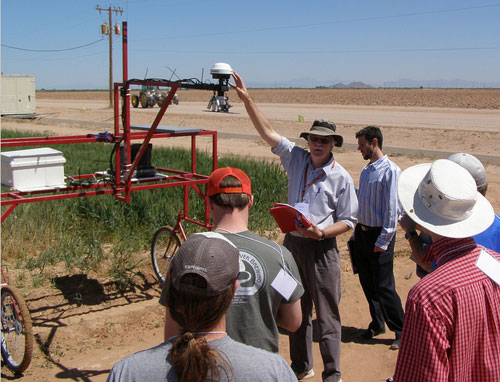Maricopa, Arizona, USA
April 8, 2014

Participants in the workshop observe features of a proximal sensing cart as explained by USDA-ARS scientist, Jeff White.
High-throughput phenotyping, a new area of research, is key to achieving progress in crop improvements. And in order to make future advancements, there is a need for training graduate students and scientists in this emerging field.
“Over the past decade, we have seen phenomenal advancements in crop genomics enabled by developments in high-throughput DNA sequencing. This automated technology in the laboratory has made understanding the genetics of crop plants very tractable,” said Jesse Poland, assistant professor in Plant Pathology at Kansas State University. Unfortunately, these same advancements in high-throughput automation have not been realized in the field for the physical appearances of the crop such as height, disease resistance or grain yield.
Thirty-five researchers, graduate students and industry representatives from around the world are participating in an innovative field-based phenotyping workshop at the Maricopa Agricultural Center (MAC) in Maricopa, Arizona April 7-10, 2014. “The diversity of participants was a pleasant surprise,” noted Jeff White, USDA-ARS plant physiologist. “The breadth of disciplines and institutions suggests that interest in field phenomics is even greater than we had originally expected and that potential applications extend well beyond plant breeding and genetics.”
Funded through a National Science Foundation grant (award #1238187), the workshop is organized by researchers from Kansas State University (K-State), the University of Arizona (UA) and the U.S. Department of Agriculture Agricultural Research Service (USDA-ARS). Clear skies in southern Arizona, combined with soil and weather conditions that provide long crop growing seasons, make the region ideal for developing and applying field-based high-throughput phenotyping technologies.
The four-day training workshop provides opportunities for participants to acquire a foundation in principles of field-based high-throughput phenotyping.
“Phenotypic measurements are still largely collected by hand. If we want to measure plant height, we get a yardstick and head to the field. The trouble with this approach is that evaluating plants in the field becomes very time-consuming and labor-intensive,” said Poland, who is principal investigator on the NSF project.
“This limits the size of populations we can evaluate for genetic studies, as well as the number of new candidate varieties we can test in breeding programs. Overall, we need automated, high-throughput remote sensing technologies that can be applied for field research,” said Poland.
This is an area where the contributions of agricultural engineers are key in advancing field-based high-throughput phenotyping. “We work in different fronts: from adapting power units to making sensor deployment in the field more efficient, to integrating sensor technology like GPS positioning and crop canopy spectral/thermal sensing. There are many technical challenges to solve, but this is rewarding work,” says Pedro Andrade-Sanchez, a precision ag specialist at the University of Arizona and a collaborator on this project.
Eleven instructors from K-State, UA, USDA-ARS, and the iPlant Collaborative will lead lectures and field-based exercises at MAC, a UA College of Agriculture and Life Sciences-affiliated agricultural experiment station located about 30 miles south of Phoenix.
Topics covered in the workshop include electronic field instrumentation, vehicle configurations, georeferencing, data management, and inverse modeling. Lectures are matched with hands-on demonstrations and field exercises, taking advantage of winter-sown experiments at Maricopa, AZ.
The first three days include daily rounds of lectures, field exercises with vehicles, and data processing. On the last day, teams of participants will present results and have an “open-lab” session where they can pursue specific interests or concerns with instructors. Training materials will be publicly available through the project website.
A second phenotyping workshop will be offered at MAC in 2015.